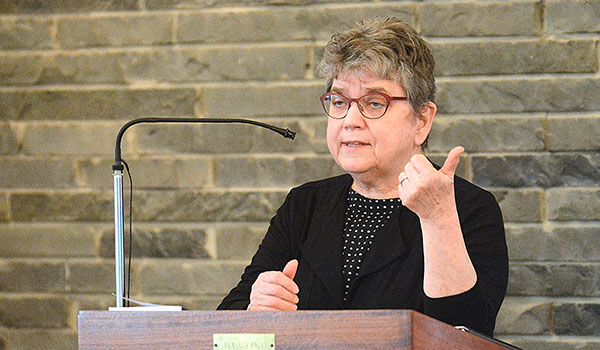Catholics, Lutherans hold ecumenical study day at seminary
by KIMBERLEE SABSHIN
In commemoration of the 500th anniversary of the Protestant Reformation, the Diocese of Buffalo has been collaborating with the Upstate New York Synod of the Evangelical Lutheran Church in America throughout the calendar year. Although the Reformation began after Martin Luther posted his 95 Theses in 1517, the goal in 2017 is to foster unity. On May 19, they joined for an ecumenical study day at Christ the King Seminary in East Aurora, with Sister Susan K. Wood, SCL, Ph.D. as keynote speaker.
The event, including Catholic and Lutheran participants, explained ecumenism and two statements that the historically divided churches released, "From Conflict to Communion" in 2013 and "Declaration on the Way" in 2015. A Sister of Charity of Leavenworth, a systematic theology professor at Marquette University in Wisconsin, and an expert on Catholic and Lutheran relations, Sister Susan has been part of the U.S. Lutheran-Catholic Dialogue since 1994 and the International Lutheran-Catholic Dialogue since 2008.
"Ecumenism is different from interfaith dialogue, which is dialogue with non-Christian religions. The purpose of interfaith dialogue is quite different," Sister Susan said. "Ecumenical dialogue is working for church unity of Christians, since we share common baptism. We don't share that baptism with Jews, Muslims, Hindus, Sikhs and the like. The goal in interreligious dialogue is mutual understanding and working together, but it's not unity in the same way. We don't have that basis of unity we have with other Christians."
Sister Susan began her presentation by explaining the point of ecumenism, which many, including some of her students, have thought is pointless since they value relativism and diversity of opinions. She noted that diversity of religious beliefs is not the same as disagreeing on ice cream flavors, since religions generally make universal truth claims. Since theologians do not see teachings as opinion, they often say that things are universal truths. Based on this philosophy, that also makes them universally true for everyone else.
"Diversity is fine, until you start hurling anathemas at one another, mutual condemnation," Sister Susan said. "That leads us into religious wars. That's when diversity is not good, when we have enmity with one other. The work of ecumenism is based on our common baptism, our common belief in God, our common scriptures. We are not trying to find 'lowest denominator Catholicism' or Lutheranism, but we are trying to find categories that transcend diversity, an umbrella that we can all stand under together and bring us into unity."
According to Sister Susan, there is also confusion among the non-theologians who discuss ecumenism. A journalist once asked her if ecumenism meant that Lutherans would be "caving in" to Catholics, which greatly angered her. "It's not about 'caving in.' Ecumenism means that we solve our differences, but we keep our identity. We cannot wipe out 500 years of history. We cannot wipe out the cultural differences that exist between Lutherans and Catholics. We can't wipe out different world views," she emphasized.
Participants at the ecumenical study day participated in a question-and-answer session with Sister Susan, table conversations focusing on points from the churches' 2013 and 2015 declarations, and an analysis of statements of agreement between Catholics and Lutherans. Topics included what unites rather than divides the two, Catholic-Lutheran marriages, and how the day resolved various misconceptions.
Pastor Daniel Hoffman, of Trinity Lutheran Church in East Amherst, said Bishop John S. Macholz of the Upstate New York Synod has been fostering ecumenism, which is something special. Both he and Bishop Richard J. Malone have been in agreement that churches working together is a good thing.
"One of the things I really want to tell you is how rare this particular event is. Across upstate New York, we have seven conferences within the ELCA in the Upstate New York Synod," Pastor Hoffman commented of this. "There are five Roman Catholic dioceses, and in those territories, we have two places where dialogue has actually taken place: in Western New York and in the city of Rochester. Nowhere else are these dialogues even occurring, so in terms of the rarity and the wonderfulness, I hope you enjoy this day."
Father Francis X. "Butch" Mazur, ecumenical officer for the Diocese of Buffalo, recalled how during his time serving as a chaplain at Erie Community Medical Center in Buffalo, he had served a woman who was reluctant to reveal that she was Episcopalian since she wanted to receive Communion in her final days. This underscored the fact that even with statements of agreement between Protestants and Catholics, there are issues with differences between them, persisting to this day, that continue to lead to such situations.
"Five decades of conversation have been going on in this country with Lutherans and Roman Catholics," Father Mazur added. "There are some remaining differences that we still need to confront. I think, as we work together as people of faith, that those remaining differences can be put aside."




